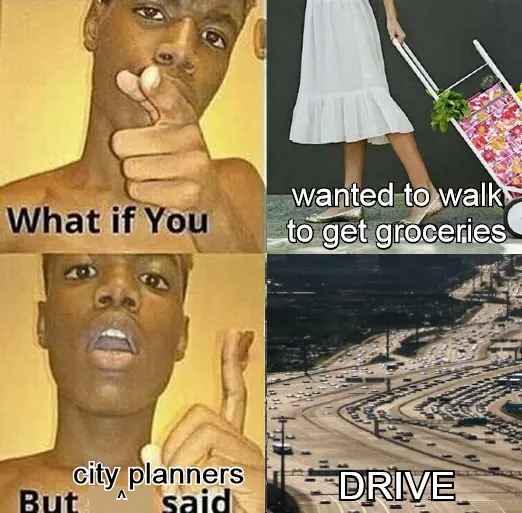Fuck Cars
A place to discuss problems of car centric infrastructure or how it hurts us all. Let's explore the bad world of Cars!
Rules
1. Be Civil
You may not agree on ideas, but please do not be needlessly rude or insulting to other people in this community.
2. No hate speech
Don't discriminate or disparage people on the basis of sex, gender, race, ethnicity, nationality, religion, or sexuality.
3. Don't harass people
Don't follow people you disagree with into multiple threads or into PMs to insult, disparage, or otherwise attack them. And certainly don't doxx any non-public figures.
4. Stay on topic
This community is about cars, their externalities in society, car-dependency, and solutions to these.
5. No reposts
Do not repost content that has already been posted in this community.
Moderator discretion will be used to judge reports with regard to the above rules.
Posting Guidelines
In the absence of a flair system on lemmy yet, let’s try to make it easier to scan through posts by type in here by using tags:
- [meta] for discussions/suggestions about this community itself
- [article] for news articles
- [blog] for any blog-style content
- [video] for video resources
- [academic] for academic studies and sources
- [discussion] for text post questions, rants, and/or discussions
- [meme] for memes
- [image] for any non-meme images
- [misc] for anything that doesn’t fall cleanly into any of the other categories
Recommended communities:
view the rest of the comments

Public transport, cargo bike, walk/public transit to go & taxi to come back, buy smaller quantities more often...
Hm so I’m American and haven’t really used public transport in this country. I have in some Asian countries like Singapore or Japan, where in the past few I’ve been specifically keeping an eye out for groceries and haven’t seen it. It doesn’t always seem feasible to have groceries though, sometimes trains are crowded.
I was more wondering if there were no cars at all, which I believe is the ideal. For environmental reasons I would say it’s best to reduce car traffic to near zero someday, though I understand this is not necessarily possible in America. In this situation there would be no taxis though.
Admittedly this question isn’t so much for myself, but it’s my understanding that many families have a single grocery buyer and lack the funds to buy smaller quantities more often. Bulk is usually cheaper. In the American culture of minimizing worker resources, I wonder if pay wouldn’t simply decrease if cars were no longer purchased, and they’d find themselves in the situation of equally low funds but no car. Maybe not the most rational concern but the American society is not overly reassuring.
Anyway as a person who needs to breathe and live on Earth I have a vested interest in a car free society, and am just wondering about the little details.